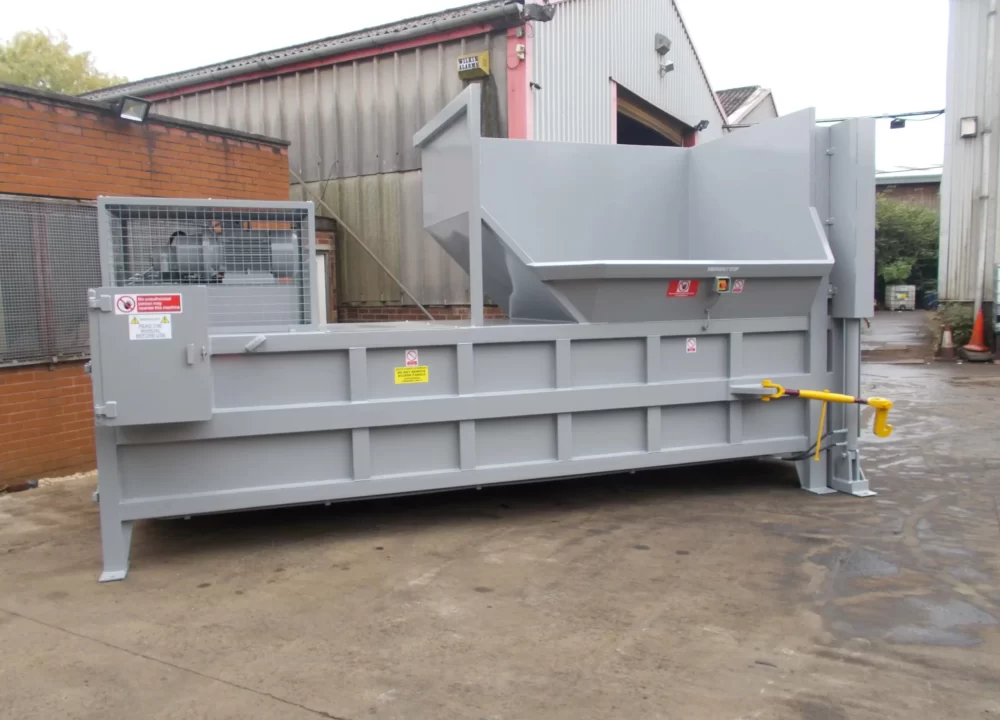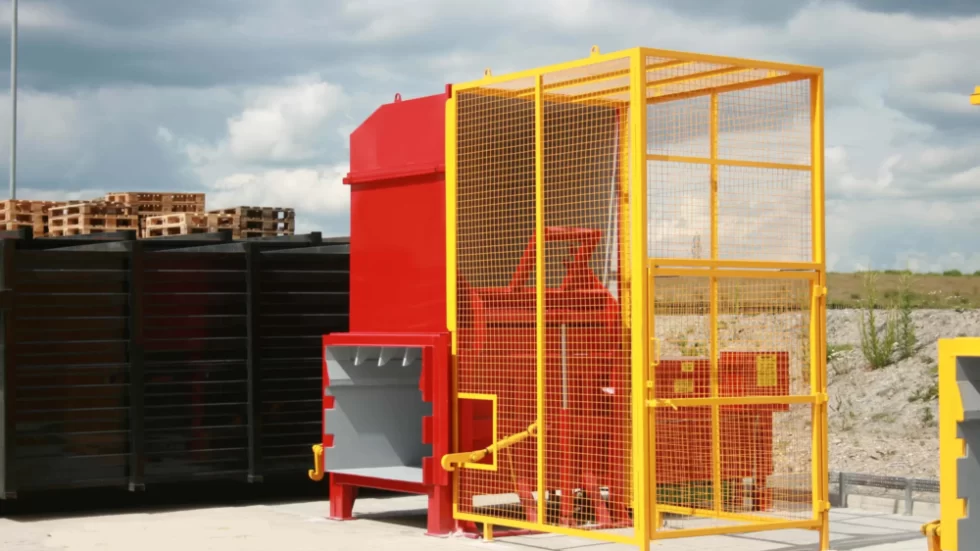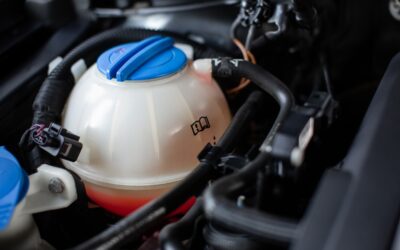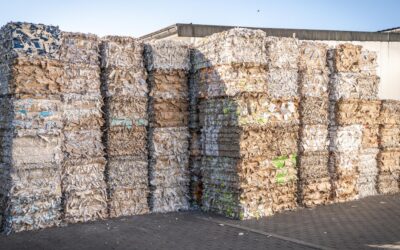Within the domain of waste management, the robustness of these machines is matched only by the toughness of the waste materials they manage.
Neglecting safety protocols when operating a waste compactor, be it a standard waste compactor or an industrial waste compactor, can result in severe outcomes. Hence, ensuring safety when managing waste collections with commercial waste compactors isn’t merely advisable; it is imperative.

Commercial waste compactor hire for your business?
Get in touch, we can help!
Get a quote
Understanding Your Compactor
Types of Commercial Waste Compactors
Commercial compactors, including industrial rubbish compactors and industrial compactors, are generally categorized into two distinct types: self-contained and stationary units.
Self-contained compactors are designed primarily for managing wet waste, effectively preventing leakage and reducing the volume of waste. On the other hand, stationary compactors are optimal for compacting waste such as dry or general waste, including office and business waste.
Utilising these compactors can lead to fewer waste collections and lower disposal costs, as they maximize the efficiency of waste managing processes.
Each type of compactor, whether used for commercial waste or general waste, necessitates a tailored safety approach due to their unique operating mechanisms.
Operating Principles
Gaining an in-depth understanding of how your waste compactor functions can substantially elevate safety levels.
Acquainting yourself with its capabilities, constraints, and operational expectations is crucial for effective handling. This foundational knowledge is pivotal in devising preventative safety strategies, empowering operators to foresee and circumvent potential risks.
Moreover, by optimizing the use of compactors, businesses can significantly reduce the need for frequent waste collections, such as wheelie bin pickups, further streamlining waste management processes and cutting down on general waste disposal costs.

Safety Best Practices
1. Before Operation
Implementing bin compactors for general waste, including both wet waste and dry waste, as well as mixed waste streams, leads to a more efficient management of waste volume.
Compacted waste requires less storage space, enabling businesses to optimize their use of wheelie bins and reduce the frequency of rubbish collections. This efficiency not only offers substantial cost savings by lowering the need for multiple landfill sites but also delivers significant environmental benefits.
Utilising these industrial machines, tailored for different waste streams, helps in minimizing the footprint on landfill sites and conserves valuable storage space.
- Examine the machine for visible damage: Look for any signs of wear, tear, or damage that could impact the compactor’s safe operation.
- Ensure all safety guards are in place: Verify that all protective barriers and guards are securely fitted and intact.
- Verify operational status of emergency stops and controls:
- Check that emergency stop buttons and controls are easily accessible and functioning correctly.
- Inspect hydraulic systems for leaks: Ensure there are no leaks in the hydraulic system, which could indicate potential failure points.
- Check electrical systems for exposed wires or loose connections: Ensure that all electrical components are securely connected and properly insulated.
- Confirm clearance around the compactor is adequate: Make sure the area around the compactor is clear of debris and obstructions.
- Review operating procedures: Refresh on the specific operating instructions and safety procedures for the compactor model.

Ready to streamline your waste disposal process?
Our commercial waste compactors are here to make it happen.
Get a quote
2. During Operation
Utilising static compactors to compress rubbish presents an economical solution for handling more waste with fewer bins, resulting in lower rubbish collection costs and fewer collections needed.
This method not only maximizes the use of physical space, requiring less physical space for waste storage but also allows for the efficient stacking of wheelie bins vertically, saving even more space.
By reducing the number of transport pallets required to move waste and ensuring fresh air by minimizing waste overflow, businesses can achieve an optimal balance between operational efficiency and maintaining a clean environment.
- Maintain awareness of surroundings: Always be cognizant of the environment and people around the compactor.
- Keep a safe distance from moving parts: Ensure no one is within the hazard zone while the compactor is in operation.
- Never bypass safety features: Confirm that all safety systems are engaged and functional.
- Adhere to operational guidelines: Follow the manufacturer’s instructions for safe compactor use.
- Monitor for signs of malfunction: Be alert to any unusual noises, vibrations, or operational issues that arise.
3. After Operation
After operation, leveraging the compacting arm to effectively squeeze large volumes of waste into 1100 litre bins not only ensures structural stability but also promotes a cost-efficient and environmentally friendly approach to the management of waste. This process reduces the lower volume of waste, leading to substantial savings on waste collection and transportation charges.
Work sites can save money and space, achieving an efficient skip lift operation that aligns with both economic and ecological goals. Regular maintenance and checks post-compaction further enhance this efficiency, securing long-term benefits.
- Clean the machine to prevent build-up: Remove any waste material or debris that could hinder the compactor’s performance.
- Inspect for any new damage or wear: Check for any damage or excessive wear that may have occurred during use.
- Schedule regular professional inspections: Plan for routine inspections by a qualified technician to ensure long-term safety and operational efficiency.
- Record any issues or maintenance performed: Keep a log of any maintenance activities or operational issues encountered for future reference.
- Secure the compactor: Ensure the compactor is turned off, secured, and, if applicable, locked to prevent unauthorized use.

Get a quote
Training and Documentation
Training Programs
Ensuring operators are thoroughly trained on using compactors is vital for any business focused on waste management.
Effective training programs cover the operation of various compactors, recognising the type of waste each is best suited for—such as general, cardboard, or industrial waste. These sessions are crucial for teaching staff how to compact waste properly, achieving maximum volume reduction while maintaining high safety standards.
Through comprehensive training, employees learn the importance of compacting efficiently, saving space, and reducing disposal costs, all within a framework of stringent safety protocols.
Maintaining Documentation
Maintaining detailed documentation of training, maintenance, and any incidents is crucial for ongoing safety. This record-keeping not only helps in identifying trends that may indicate emerging safety issues with machinery but also ensures compliance with regulatory requirements.
Personal Protective Equipment (PPE)
To meet high safety requirements, especially when operating a bin compactor, the use of Personal Protective Equipment (PPE) is essential. Whether compacting cardboard for recycling or disposing of waste into a wheelie bin, PPE such as gloves, goggles, and protective clothing shields operators from potential hazards.
This protective gear is crucial not only for safety when handling materials directly but also for ensuring a safe operation of the compactor as it efficiently reduces a substantial amount of waste into a more manageable volume.
Proper PPE usage ensures that every task, from loading the wheelie bin vertically into the compactor to the compacting process itself, is conducted with the utmost safety, thereby safeguarding the well-being of all involved.
Dealing with Hazards and Emergencies
Identifying Potential Hazards
Recognising potential hazards associated with waste compactors, such as pinch points, electrical risks, or the possibility of flying debris, is the first step in prevention. Regular hazard assessments can inform safety protocols and training programs.
Emergency Procedures
Equipping operators with knowledge of emergency procedures is imperative. This includes knowing how to quickly shut down the machine, administer first aid, and contact emergency services. A calm and informed response to emergencies can significantly reduce the severity of incidents.

Get a quote
Commercial Waste Compactors for your business
Ensuring the safe operation of commercial waste compactors is a multifaceted endeavour that encompasses understanding the equipment, rigorously adhering to safety best practices, committing to thorough training, employing the correct Personal Protective Equipment (PPE), and being well-prepared for any emergencies.
Prioritising these aspects not only safeguards the well-being of employees but also enhances the operational lifespan of the equipment, contributing to a more secure and efficient waste management process within the industry.
Moreover, selecting the right waste compactor for your business needs is a crucial step towards achieving these safety and efficiency goals. If you’re considering adding a commercial waste compactor to your operations, or if you have questions about how to optimise your current dispose management solutions, don’t hesitate to reach out to us.
Our team of experts is on hand to provide you with tailored advice, ensuring that you choose the most suitable equipment for your specific requirements. Together, we can make your workplace safer, more efficient, and environmentally responsible. Contact us today to explore how a commercial waste compactor can benefit your business.





